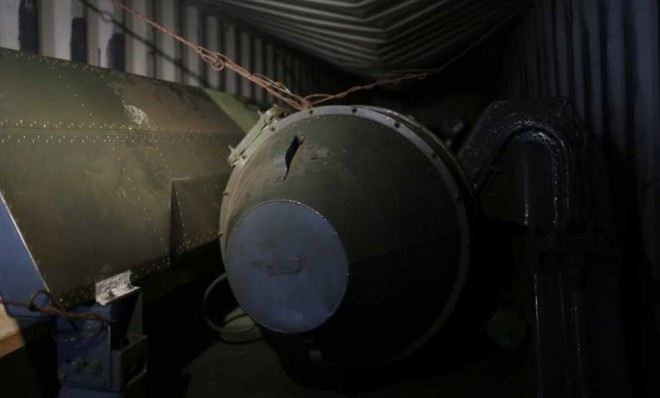Why was Cuba sending Soviet-era weapons to North Korea?
Panama intercepted an aging Korean ship with decades-old antiaircraft missiles and two fighter jets hidden behind bags of sugar


A free daily email with the biggest news stories of the day – and the best features from TheWeek.com
You are now subscribed
Your newsletter sign-up was successful
On July 12, Panama seized the North Korean cargo ship Chong Chon Gang as it entered the Panama Canal, working off a tip that the aging ship, traveling back home after a stop in Cuba, was carrying narcotics.
When Panamanian navy boarded the ship, the North Korean captain apparently faked a heart attack then tried to commit suicide, Panamanian officials say, and the 35 crew members started to riot, attacking the Panamanian marines, mostly with sticks, before being subdued and detained. After dragging the ship to the Caribbean port of Manzanillo, the Panamanians started digging under the 10,000 tons of unrefined Cuban sugar the Chong Chon Gang was transporting. They didn't find drugs.
Instead, Panamanian President Ricardo Martinelli tweeted on Monday, they found this ("Panama captured North Korean-flagged ship coming from Cuba with warlike, undeclared cargo"):
The Week
Escape your echo chamber. Get the facts behind the news, plus analysis from multiple perspectives.

Sign up for The Week's Free Newsletters
From our morning news briefing to a weekly Good News Newsletter, get the best of The Week delivered directly to your inbox.
From our morning news briefing to a weekly Good News Newsletter, get the best of The Week delivered directly to your inbox.
Martinelli speculated that the initial findings included "sophisticated missile equipment." That depends on your definition of "sophisticated." The experts at IHS identified the items in Martinelli's tweeted photo as an RSN-75 "Fan Song" fire-control radar, used to guide SA-2 surface-to-air missiles to their targets. The Soviet Union started building similar systems in the 1950s, and used an SA-2 missile to shoot down America's U-2 spy plane in 1960.
Late Tuesday night, Cuba claimed the weapons, and added another piece to the puzzle. The "obsolete defensive armaments" from the mid-20th century are on their way to North Korea for repairs, Cuba's foreign ministry said. The two antiaircraft missile systems, nine disassembled missiles, and two MIG-21 fighter jets plus 15 jet engines were to be sent back to Cuba, the foreign ministry added, to help "maintain our defense capability to protect national sovereignty."
This is actually a plausible explanation. Many countries still use old SA-2 missile defense systems, Cuba apparently among them, and North Korea is better known for exporting weapons systems to its dwindling list of allies than importing them. Besides, says IHS, "North Korea's air defense network is arguably one of the densest in the world" already, and the "cargo of sugar could be a payment for the services."
On the other hand, North Korea is bulking up its military under new leader Kim Jong Un, while Cuba is taking a more conciliatory stance with the West. And North Korea's ample air defenses are "based on obsolete weapons, missiles, and radars" that would prove "ineffective in a modern electronic warfare environment," IHS notes. So it's certainly possible that "the radar equipment is being sent to North Korea to augment its existing air defense network."
A free daily email with the biggest news stories of the day – and the best features from TheWeek.com
Either way, as fellow Cuban Ricky Ricardo might say, "Raul Castro, you got some 'splainin' to do!" says James Gibney at Bloomberg View. The fact that the military cargo was buried under bags of sugar, plus "the violent reaction of the crew and its captain," strongly suggest that "the shipment was covert." If actual weapons are turned up, this shipment would constitute a violation of U.N. Security Council sanctions, Gibney says. "The Cubans should have their noses rubbed in this at the United Nations, at a minimum."
It will take a few days for Panama and possibly U.N. inspectors to search the whole ship — the Chong Chon Gang crew disabled the ship's crane, so the tons of sugar will have to be unloaded manually. And even if no violations of U.N. sanctions are discovered, the armaments probably won't reach North Korea: Not declaring cargo is likely grounds enough for Panama to keep the illicit goods.
That wouldn't appear to be a big loss for anyone, say Rick Gladstone and David E. Sanger at The New York Times. After all, the contraband weapons "would make a nice exhibit in a museum of cold war military artifacts." But the episode offers "a window on the desperate measures North Korea is taking to keep hard currency and goods flowing at a time when its ships are tracked everywhere, old customers like Syria and Iran are facing sanctions and scrutiny of their own, and its partners have dwindled to a few outliers."
The North Koreans "are stumped for money, they are incredibly poor," Hugh Griffiths at the Stockholm International Peace Research Institute tells The New York Times. "Business deals that might look silly to us don't look ridiculous to them."
For more details, CNN has this report:
Peter has worked as a news and culture writer and editor at The Week since the site's launch in 2008. He covers politics, world affairs, religion and cultural currents. His journalism career began as a copy editor at a financial newswire and has included editorial positions at The New York Times Magazine, Facts on File, and Oregon State University.
